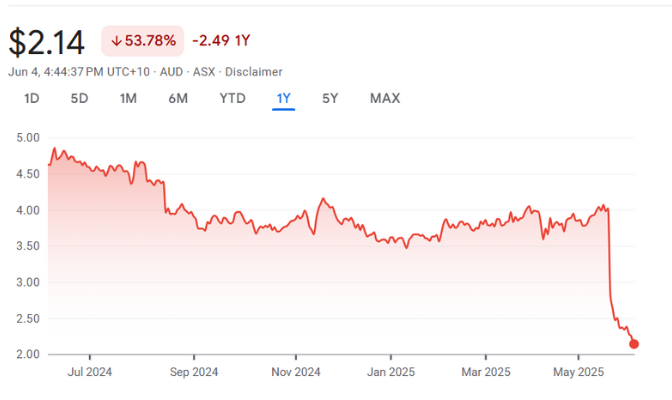Nufarm Limited
(ASX: NUF)Share Price and News

About Nufarm Limited
Nufarm Limited traces its origins back to 1956, when it began as a modest operation in Melbourne focused on supplying phenoxy herbicides to farmers in Victoria. Since then, it has transformed into a multinational corporation specialising in crop protection chemicals and seed technologies, with a footprint spanning over 100 countries.
The company’s product range includes herbicides, fungicides, insecticides, and seed treatment products designed to protect and improve crop yields across various agricultural markets. Nufarm distinguishes itself in the competitive agrarian chemicals sector through its dual focus on traditional crop protection and innovative seed technology solutions.
The company invests heavily in research and development, aiming to deliver sustainable, efficient products such as omega-3 canola and carinata seeds. These innovations address global trends that emphasise sustainability and higher-value crop traits, which are becoming increasingly important amid rising climate concerns and changing consumer demands.
Nufarm operates multiple manufacturing facilities worldwide, including key sites in Australia, New Zealand, Europe, Asia, Africa, and the Americas. This global presence allows the company to service diverse agricultural economies, providing a buffer against regional market fluctuations. Nevertheless, managing such a broad portfolio requires careful coordination and investment to maintain a competitive advantage.
Nufarm Company History
Nufarm’s journey from a regional supplier to a global player has been marked by steady expansion and strategic repositioning. After its founding in the 1950s, the company rapidly grew through the 1980s and 1990s by investing in manufacturing capabilities and entering new international markets.
These moves helped Nufarm build a broad customer base and diversify its revenue streams beyond Australia. A key turning point came in 2000 when Nufarm separated from Fernz Corporation, becoming an independent entity listed on the ASX.
This move allowed it to focus on growth and capitalise on global opportunities, especially in crop protection chemicals. Over the following two decades, Nufarm strategically expanded its product offerings and geographic footprint. In 2019, the company made a significant divestment, selling its South American crop protection and seed treatment businesses to Sumitomo Chemical for approximately US$900 million (A$1.188 billion).
This sale aimed to streamline operations and focus on higher-margin, core markets in Europe, North America, and Australasia. While this deal provided significant capital, it also marked a shift away from a region with considerable growth potential, reflecting management’s reassessment of its strategic priorities.
Despite these efforts, Nufarm continues to face challenges in integrating its seed technology operations profitably. These challenges, coupled with commodity price volatility and shifting regulatory landscapes, have influenced the company’s financial results and investor sentiment.
Future Outlook of Nufarm Limited (ASX: NUF)
Looking ahead, Nufarm faces a critical phase that will shape its future direction. The company’s latest financial results showed a 6% drop in EBITDA for the first half of FY2025, along with a sharp 46% decline in earnings from the seed technology division. This underperformance has triggered questions about the division’s viability and its impact on overall profitability.
In response, Nufarm’s board has initiated a strategic review of its seed technology business, with UBS appointed to advise on potential partnerships, joint ventures, or outright divestment options. This review could lead to significant restructuring, which might unlock shareholder value if executed effectively. However, it also carries risks if market conditions or operational issues limit buyer interest. Despite these challenges, Nufarm’s core crop protection segment remains resilient.
The company benefits from a diversified product portfolio and geographical spread, which provides some insulation from regional crop cycles and commodity price swings. Continued demand for agricultural chemicals driven by global food security concerns supports the medium-term outlook.
Sector trends also favour companies like Nufarm that innovate around sustainability. Increasing regulatory pressure to reduce chemical residues and improve environmental outcomes is pushing growers to seek advanced, safer products. Nufarm’s investments in seed technology and precision agriculture position it to capitalise on these shifts, provided it can improve execution and cost management.
Investors should also consider macroeconomic risks, including global trade tensions, currency fluctuations, and climatic variability, all of which can impact agricultural input demand and supply chains. The next 12 to 24 months will be critical for Nufarm as it balances growth initiatives against cost discipline and shareholder returns.
Is Nufarm a Good Stock to Buy?
For investors considering whether to buy Nufarm shares, the decision requires a careful assessment of both opportunities and risks. The company’s strong global presence and comprehensive product suite provide a solid foundation. Additionally, its commitment to innovation in seed technology aligns with long-term agricultural trends focusing on sustainability and productivity.
On the downside, recent financial struggles, particularly in the seed technology arm, and concerns about capital allocation have dampened investor enthusiasm. The share price’s steep decline reflects these concerns, creating a valuation that some may find attractive for a turnaround play, while others may view it as a sign to steer clear until clearer improvements emerge.
Nufarm currently offers a modest dividend yield of approximately 1.68%, with dividends being unfranked. This yield may appeal to investors seeking income, but it is relatively low compared to other Australian stocks, and the lack of franking credits could reduce overall tax efficiency for local investors.
Analyst sentiment is cautious, with a consensus rating of "Neutral" and price targets ranging from $1.96 at the low end to $4.40 at the optimistic end. Many brokers stress the importance of watching the strategic review's outcome and the potential for operational improvements before committing significant capital.
Ultimately, investors with a higher risk tolerance and a longer-term horizon might view Nufarm as a speculative buy, betting on management’s ability to resolve issues and capitalise on sector tailwinds. Conversely, conservative investors may prefer to wait for clearer signs of financial stability and strategic direction before investing.
Our Stock Analysis
Nufarm (ASX:NUF): Hit by lower commodity prices, adverse weather and Trump’s tariffs
Have some sympathy for Nufarm (ASX:NUF). Companies capped at over $1bn rarely plunge 30% after reporting results unless the results…
Frequently Asked Questions
Nufarm currently offers a dividend yield of about 1.68%. However, recent dividends have been unfranked, meaning investors do not benefit from Australian tax credits attached to the payments.
